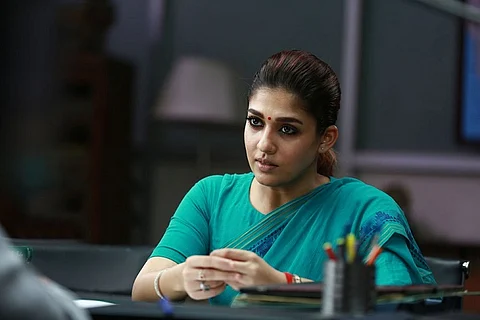

(Note: Some spoilers ahead.)
Watching Aramm is a deeply unsettling experience. The film doesn’t just claim to breaking stereotypes; it genuinely does so.
As clichéd as it might sound, Nayanthara in Aramm is not the typical Tamil cinema heroine. That was, of course, to be expected but what's refreshing is that she is not even the regular off-beat heroine of Tamil cinema.
She is not possessed like Arundhathi (Arundhathi), nor reclusive like Archana (Mozhi). She breaks every single stereotype ever constructed around dominant women characters in Tamil cinema.
Madhivadhani in Aramm is the morally upright bureaucrat you often see in Tamil cinema. One who is trying to fight the system from within. But unlike characters from other such films, Madhi doesn’t go about flexing her muscles or spouting lengthy dialogues.
Aramm belongs to a socio-political genre, but unlike many Tamil movies that fall into the genre, Aramm is honest and in a sense, brave. It risks leaving its star Nayanthara speechless when a nameless village elder asks her for a ‘medicine for thirst.’ I cannot think of another hero who would have agreed to be stunned into silence. Much later, Madhi says she can only find a temporary solution – and does that.
The film is striking in that it doesn’t make an awe-inducing persona out of Madhivadhani.
Unlike the regular ‘superstar’ Tamil movies, Madhivadhani is not a superwoman who has a handy solution for every social issue. Madhi is aware of her limitations, and that makes her struggles all the more genuine and challenging.
Her empathy for the family trying to rescue their four-year old daughter from a borewell is not a ‘heroic act of benevolence’ that Tamil cinema is so accustomed to. It is more a simple yet profound act of remaining true to one’s conscience.
Yes, we have the family expressing gratitude to the collector but she has her feet grounded. Nayanthara – unlike many heroes – is human enough to inconsolably break down at the sight of a very small victory her struggle earns for the family.
Unlike many superstars, Nayanthara’s portrayal is sensitive and often tumultuous – in a vulnerable moment, she even speaks about how hard it is as a woman to work in a bureaucratic set up. In doing so, she perhaps betrays her lack of confidence and inner struggles. But that makes Madhivadhani all the more endearing.
Madhi might lack Nayanthara’s quintessential panache, but she will leave the audiences asking for more.
In juxtaposing "developed" India which sends rockets to space and water starved neglected India, debut director Gopi Nainar asserts himself as a rare political voice in mainstream Tamil cinema.
Aramm also talks about water scarcity as a political issue without cloaking it in euphemisms.
The word 'Aramm' – director Gop Nainar said in an interview – is both Dharma and Neethi (Justice). Tamil literature says so, too. When she says Aram seithu pazhagu, Avvaiyar was essentially urging her readers to practice benevolence.
Aram Paaduthal is also a poetry form used by Tamil poets who feel that they have been wronged. On completion of recital, the hero of the poem is inexplicably dead, offering some sort of justice to the poet. Nandhi Kalambagam in 9th century is perhaps the most famous work of that genre.
Madhivadhani’s act perhaps falls under both categories. If her empathy to the struggling family is dharma, her decision to quit bureaucracy and pay the system back in its own coin is justice.
The deep layers don’t stop with the title.
With just three songs, Ghibran adds various new layers to the intensity of Aramm. If Thoranam Aayiram in Vaikom Vijayalakshmi’s searing voice is about romance between the husband and wife that manages to sparkle despite the exigencies of everyday life, Pudhu Varalare is again an unlikely song for a superstar like Nayanthara.
Shorn of frills, the song exhorts Madhivadhani to ‘lend herself as support’ to her people. In both songs, Uma Devi effortlessly consolidates her position as a lyricist to reckon with – with her use of rustic imagery standing out prominently.
In more ways than one, Aramm is a new experience to Tamil cinema. When was the last time you had a film which builds a gripping narrative around a sensible woman character?
Aramm successfully does just that.